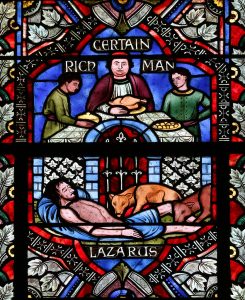15th Sunday after Trinity St Andrew’s 2025
Today we celebrated the 15th Sunday after Trinity accompanied by Alison
This Week
Tuesday 10am – Prayer Group in the Garden Room
Thursday 10am – Said Holy Communion followed by coffee in Friendship House.
Next Sunday 5th October is our Harvest celebration which will be followed by a Soup and Pud lunch after the service. Everyone is most welcome. Any harvest offerings for the alter will be gratefully received. Fresh fruit and veg and any preserves can be sold at the lunch.
Saturday 11th October 2pm – Church walk followed by tea in the hall
Readings for next Sunday – 16th Sunday after Trinity – Harvest Festival – Psalm 100 Philippians 4 4-9 John 6. 25-35
 Today’s readings – Amos 6:1,4-7, 1 Timothy 6:6-19, Luke 16 19-31
Today’s readings – Amos 6:1,4-7, 1 Timothy 6:6-19, Luke 16 19-31
I am very much looking forward to a four day trip to Rome in November with my great friend Nicky. The focus of our visit is the Vatican. Apart from the obvious splendour, history and significance of the establishment I am particularly keen to view the magnificent art for which it is so famous.
I have always enjoyed a great love of religious art. Galleries throughout the world are full of such work. Scripture with all its drama, mystery and vitality lends itself superbly to artistic depiction.
The gospel this morning must surely be an artist’s dream as it shows vivid imagery of the real and the surreal. The parable of the Rich Man and Lazarus is a story clearly and dramatically expressed. So rich in contrast and simplicity it would probably require two paintings.
The first would portray the rich man reclining on his couch amid luxury and slaves, resplendent in his fine purple gown, lording it over everyone. And then in the foreground there would be Lazarus, poor and impoverished, lying at the gate – dying of starvation, surrounded by dogs licking his wounds.
But in the next painting the tables have turned. The rich man becomes the poor man, suffering torture and burning in anguish in hell, pleading with Lazarus to cool his tongue while Lazarus is pictured in the comfort of the bosom of Abraham.
On the face of it there is a simple message here: do not be so absorbed in your own life as to neglect those around you. It sounds obvious and most of us are very good at minding our neighbours, but I suspect there may be times, owing to our own demands on life that we may overlook others around us.
And this is where the rich man went wrong. He had not been actively cruel to Lazarus; he had not ordered Lazarus to be removed from his gate. He had happily let him take the bread that he had thrown from his table and he had not kicked him as he passed by. He was not deliberately cruel to him. But the fact is he had never really noticed Lazarus. It was as if he was part of the landscape and it never occurred to him that it might be wrong. While Lazarus was there starving, he wallowed in luxury. His problem was he could look on the world’s suffering but it did not touch his heart and stir his conscience. This is a story of a man who wasn’t deliberately cruel, he was just a man who never noticed.
The rich man found himself in hell not because of his actions, but because of his inaction, his blindness, both toward the world outside his own narrow sphere and to the word of God. He was indifferent to both. He was blind and unable to see Lazarus, and deaf, unable to hear the word of God.
When Christ came into our world, he showed us the ways of the kingdom of God by being with people and teaching in crowds, often ministering to only one or two people at a time. Here Jesus is asking us to open our eyes mentally, to be aware of all that surrounds us in our own small environment.
However, as in common with so many of the parables there is more to this one with its strong imagery than a simple message of compassion and awareness.
This parable also speaks of heaven and judgment, of a life beyond this one. A mysterious place which in this earthly life we have little understanding of and according to the text here where we will be judged. Judgement is always an uneasy subject, but the parable here makes it quite clear that we will be judged and harshly with a great chasm between the good and the bad. So, it tells us quite plainly what we need to do to prepare for eternity, we need to repent.
This may all sound rather stark and certainly not very encouraging but in the last verse we have a reference to the resurrection.
It is in Christ’s resurrection where our ultimate hope and salvation is found. Jesus rose to new life: his victory over death therefore assures us of our own rising from the dead and so bringing us the same eternal blessings enjoyed by Lazarus.
